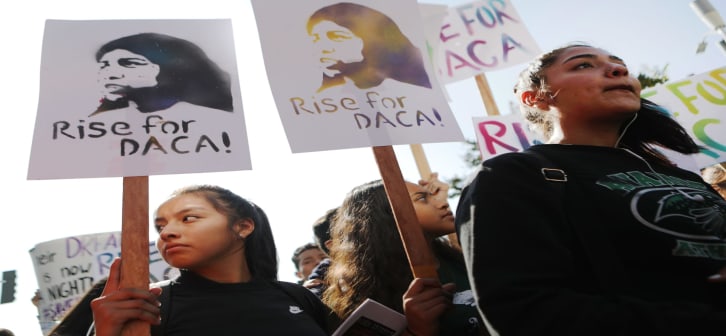Recommended DACA Rules Provide ‘Certainty’ for Dreamers in College
Writer
Writer

- The government is now in the process of solidifying new rules for DACA.
- Advocacy groups are trying to influence the rules to help DACA recipients pursuing higher education.
- Among their recommendations are solutions proposed in the Build Back Better framework and Dream Act.
Advocacy groups are asking that the federal government prioritize college students as it crafts new rules for the Deferred Action for Childhood Arrivals (DACA) program.
The Department of Homeland Security (DHS) is in the process of generating new rules aimed to strengthen the Obama-era program implemented in 2012. The rules change comes after a federal judge in Texas last July determined that the Obama administration did not use the right legal procedure to implement the program. Previously, DACA allowed around 650,000 active recipients who were brought to the U.S. as children to remain in the country.
The judge's order did not take DACA eligibility away from current recipients, but it did force the government to stop accepting new applications.
DHS released a draft of the new DACA rules in September. On Monday, a coalition of higher education advocacy groups led by the American Council on Education (ACE) sent a letter to DHS Acting Chief Andria Strano with a list of eight recommendations to consider as the department crafts a final plan. The letter suggests making DACA recipients eligible for federal financial aid and giving them the ability to travel outside the country for study abroad programs, among other requests.
In addition to ACE, signatories include the Hispanic Association of Colleges and Universities and the National Association of Student Financial Aid Administrators.
Here are the letter's bigger requests:
Make Financial Aid Available to DACA Recipients
The current version of President Joe Biden's $1.75 trillion domestic spending plan, the Build Back Better Act, would expand the Pell Grant maximum and allow DACA recipients to apply for grants within the program. These grants help nearly 7 million low-income students pay for higher education each year.
Should this portion of the Build Back Better plan make the final bill, which is still being reconciled in the Senate, the letter asks for DHS to make DACA students eligible for all Title IV benefits in the program's new rules. These benefits include access to Pell Grants, federal student loans, and work study programs.
According to the Presidents' Alliance on Higher Education and Immigration, there are more than 427,000 undocumented students the higher education system in the U.S. The organization estimates that approximately 181,000 of these learners either hold DACA status or are eligible for DACA. The signatories' proposed change would provide many of these students the chance to more affordably attend school.
The letter also asks that DHS ease the process of verifying financial aid for DACA recipients. It states that these students oftentimes have difficulty proving the need for financial aid because of their immigration status. These students may not have access to the documents necessary for proving their need for aid, such as a parent's tax returns.
Simplify Work Authorization Application
The process by which DACA recipients can legally work in the U.S. is another chief concern of the coalition of higher education advocacy organizations.
Currently, when people apply for DACA, they receive both deferred action on their immigration status and authorization to work in the U.S. DHS is proposing to separate these two applications, but College advocacy groups take issue with DHS's proposal to require potential DACA recipients to apply for these two benefits separately.
The problem with this change, the signatories say, is that it could further complicate the hiring for DACA recipients who graduate from school and then have to apply for work authorization. The separation of these benefits could also cause their immigration status and work status to become misaligned in date, adding confusion to an already confusing process.
"While the proposed rule notes that, 'some DACA requestors may not need employment authorization," we question how often a DACA applicant would choose to NOT apply for work authorization," the letter states. "We believe this would likely be a very limited population of DACA registrants."
These advocacy groups recommend the process remain as it currently stands, in this regard.
Allow DACA Recipients to Study Abroad
Advanced parole is the process that allows people in the U.S. with pending immigration applications to travel abroad and reenter the country.
The authors of this letter ask that the new DACA rules explicitly state that DACA recipients will be able to apply for advanced parole. This would allow DACA registrants enrolled in school to partake in study abroad programs.
Adopt Dream Act’s DACA Timeline
In the letter, the higher education coalition also asks DHS to expand the time period in which immigrants can be DACA eligible.
Under the original rules, only those who arrived in the U.S. before their 16th birthday, have continuously resided in the country since June 2007, and were physically present in the U.S. as of June 2012 can qualify. However, the letter suggests that DHS widen this timeline to include children who were brought to the U.S. after their 16th birthday and may or may not meet the other criteria.
"We remain concerned that the criteria as included in the proposed rule will exclude many young Dreamers currently studying at colleges and universities, and those seeking to do so," the letter states.
However, the signatories do not propose new deadlines DHS should include as alternatives, but rather suggest adapting the criteria put forth in the DREAM Act of 2021.
Latest News
Related Stories
Featured Stories
Latest Analysis
College Accreditation Is Changing. Here’s What Students Need To Know.

11 Red States Are Suing to Block Biden's SAVE Loan Repayment Plan. Here's What Borrowers Need to Know.

Here's Where the 2024 Presidential Candidates Stand on Higher Education

College Admissions, Student Diversity, and Campus Culture 50 Years Ago












